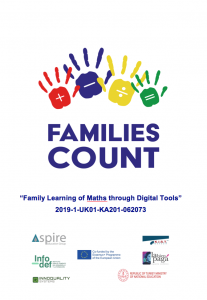
Numeracy and basic maths are key foundations for further learning and are a gateway to employment and social inclusion. Nevertheless, across the EU, 22 % of 15-year-olds underachieve in mathematics. Among pupils with low socioeconomic status, this is a worrying 36.6 %.
There is evidence that early exposure to math education concepts, activities, ideas, and ‘math talk’ positively impacts later school achievement. Nevertheless, low-income students are more likely to be exposed to weaker math content in schools. This school inequality is part of a larger socioeconomic performance gap that also includes the students’ home background (OECD/2017)
Families from the more disadvantaged social groups generally tend to collaborate less with schools. Specifically, those parents who live in urban environments, with low incomes and are immigrants or ethnic minorities are those who face greater barriers to collaboration. Achieving effective collaboration with the school is a particularly important issue for disadvantaged families, as it can be decisive in this group achieving academic success (EC, 2016).
An insufficiently explored approach to overcome the difficulties to involve parents from disadvantaged families in the education of their children is the Family learning pedagogical approach. Family learning is an effective way of providing adults with the skills and knowledge to support their children’s education.
NGOs and other social partners supporting disadvantage families can play also a key role facilitating the work with these families through Family Learning methods, strengthening their participation and engagement with the school system. Additionally, the influence of new technologies on children’s mathematical competences should be explore, so as to ensure appropriate methods to exploit the potential of such technologies for new forms of learning (EC/2018)
The aim of FAMILIES COUNT project is to promote the acquisition of skills and competences in Maths through innovative Family Learning teaching methods based on Digital Tools addressed to disadvantaged families. To do so, six organizations, including school authorities, entities supporting unprivileged families and experts in family learning and digital-based pedagogies from five countries and six organisations (Aspire Education (UK), INFODEF and La Bien Paga (Spain), Innoquality Systems (Ireland), Ministry of Education (Samsum, Turkey) and Kist Consult (Austria), will work together to equip family learning practitioners, tutors and headteachers with the necessary skills and innovative digital tools to support students and parents from disadvantaged families to acquire and improve their competencies in maths.
The project partners will design and co-create the following outputs:
- An Online Digital Database of good practices and resources on Family Learning of Maths (IO1),
- A Training Curriculum on Family Learning of Maths (IO2)
- The FAMILIES COUNT Pedagogical Handbook (IO3)
- The FAMILIES COUNT Digital Toolkit (IO4), a set of innovative tailor made digital apps and
Family learning practitioners, tutors and headteacher working at schools and entities supporting unprivileged families are the main target users of the project products and final beneficiaries are students and parents from disadvantaged families.